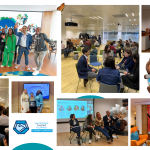Responsible leadership is essential in the current business climate. We all have a role to play in building a better world and a fairer society. Now is the time to step up and take action. To fully understand responsible leadership and how businesses can become powerful agents of change, we spoke to three trailblazers.
Cultivate Equality at Work
Use Trailhead to reflect on the value of diversity and inclusion at work and what you can do to promote equality.

From encouraging diversity to enabling sustainability, we reveal why balancing purpose with profit has never been so important to the future of our planet – and the success of your organisation.
Responsible leadership starts with investing in future talent
The COVID-19 pandemic has highlighted the need for digital skills both in our personal and professional lives. “Every aspect of society is connected to digital; it’s a basic skill for everybody,” said Martine Tempels, who is an Executive Vice President at Belgian telecommunications provider Telenet, as well as a board member of STEM and founder of CoderDojo Belgium.
For future generations and innovations, digital skills should be top of mind in responsible leadership.
And that’s exactly what Tempels has done. As an ambassador for ICT, she toured schools hoping to inspire youngsters to become part of the digital world. But she hit a problem: digital was perceived as being difficult and nerdy. “That’s when I discovered CoderDojo in Ireland, and they had one rule and that’s being cool.” Tempels was so inspired by the nonprofit’s work that she went on to found a Belgian group, which she now chairs.
CoderDojo provides young people with informal learning environments where they can creatively explore technology. In Belgium, it now reaches around 18,000 children and is supported by 2,000 volunteers.
Engaging with nonprofits is essential for responsible leadership
Tempels’ work with CoderDojo and Telenet taught her a lot about the importance of responsible leadership and collaboration between businesses and nonprofits. “You discover what engagement really means,” she said. “And the power of engagement is something we sometimes miss in corporate life.”
By collaborating with nonprofits, businesses and their teams can find a greater sense of purpose by supporting local communities. “It’s an opportunity for your employees to do something for society.
Protecting the world’s resources and tackling climate change also need to be high on the responsible leadership agenda. Over a third of employees favour businesses that focus on social equity and environmental protection.
“People are looking to work for a company that has a purpose, a clear mission. If you want to attract talent, it’s becoming more and more relevant to have that mission at the forefront,” said Rens Van Haute, Co-founder and COO at Bolt Energie, which provides Belgian consumers with access to 100% local and green electricity.
Encourage greater diversity to become a responsible leader
To create a fairer society, we need to build more representative workforces. And that means responsible leaders need to reach new audiences. “We believe there is an abundance of hidden talent in every community,” said Nieuwenhuis. “As employers, we need to reach out and go into local neighbourhoods to find the talent.”
He recommends looking at people’s practical talents and abilities rather than just the qualifications on their CVs when recruiting new team members – especially for roles within IT. “Every person has some soft and hard skills that connect with the different roles in IT,” said Nieuwenhuis. “We have now over 60 partners working together to bring hidden talent into the labour market.”
Responsible leadership also means facilitating greater inclusion and diversity. This will not only help businesses attract new talent but also boost their competitive advantage. Nearly 80% of talent professionals say that diversity will be very important to the future of recruiting.
Want to know what you can do to cultivate equality in the workplace? Encourage responsible leadership in your workplace and learn what you can do to promote equality with this free online training module on Trailhead.
Cultivate Equality at Work
Use Trailhead to reflect on the value of diversity and inclusion at work and what you can do to promote equality.

























